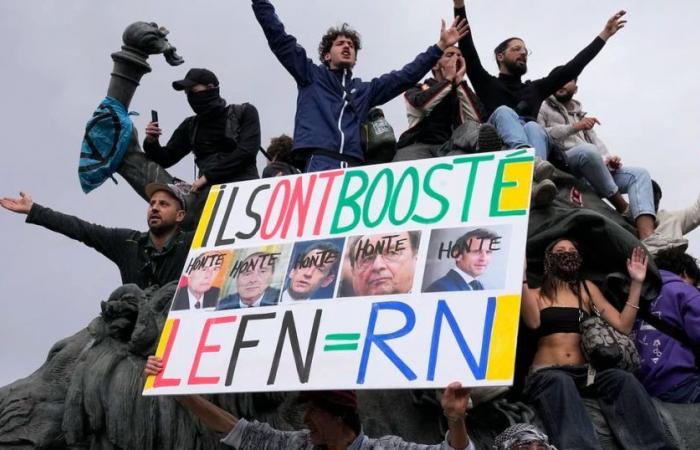
All the polls predict the success of the National Group (RN) candidate, Jordan Bardella in the legislative elections in France. But could it really be described as a success if his party did not achieve an absolute majority? The truth is that the polls will give, except for a major surprise, a scenario of cohabitation -a prime minister from a different party than the one holding the presidency-.
In France there are two highest representatives of the State. On the one hand, the president of the Republic, Emmanuel Macron, who exercises the function of Head of State. On the other hand, the prime minister, now Gabriel Attal, the Juntos candidate –Essemble-, to which Macron’s party, Renaissance, belongs. This coexistence scheme was designed as control system between both positions.
The French Magna Carta states that, after the vote is known, the president will be in charge of propose a candidate to the position of prime minister, which must necessarily have the approval of the parliamentary majority. In a scenario of cohabitation – France has experienced this three times in its history – if a party achieves an absolute majority, the candidate would respond only to the will of the National Assembly, so Macron would not be able to designate the composition of the new government. with the exception of the Minister of Foreign Affairs and Defense, exclusive powers of the Head of State.
However, in these elections, an absolute majority seems, pending what the scrutiny shows, far from being achieved. In any case, if the formation with the most votes in the first round fails to gather an absolute majority, it must seek support in a coalition that combines the 289 parliamentarians needed in the National Assembly.
In the hypothetical case that RN emerged as the party with the most votes at the polls, Macron would be forced to propose his candidate for the position of prime minister. The Parlament would accept, with the favorable votes of the RN parliamentarians, the investiture of Bardella, who could govern but with a simple majority, given the refusal of all parties to form a coalition.
The traditional right of the Republicans has already demonstrated this, whose leader, Eric Ciottiwas expelled – and readmitted by order of Justice – for allowing himself to be seduced by the idea of belonging to a government in conjunction with the National Group.
The leader of the National Group has reiterated on numerous occasions that he would not govern if it were not with an absolute majority, so we would have to wait first whether he accepts the position or not, since within the group there is a certain fear of governing without support. And they have reasons for it. France will experience presidential elections in 2027 and an unstable government in a situation of blockade could damage the image of a party that also aspires to become president.
“I would find it very strange if there were no institutional blockage. Even the parties that could support the far right with concrete measures are not going to do so,” he said in a conversation with Infobae Spain Arsenio Cuenca, political scientist specialized in the study of extremism. Cuenca clarifies that a situation of institutional blockade does not imply the impossibility of approving specific measures through decrees. Cuenca recalls that Macron holds the record of the entire Fifth Republic in approving measures through this parliamentary resource.
Arriving at this scene of institutional chaos, the Elysée begins to explore the implementation of a emergency government, that is, a provisional Executive in which politicians are not the ones who govern, but experts. “With Macron you never know to what extent he can stretch the Constitution’s gum,” Cuenca ironically says. One of the most popular names in France is that of the president of the European Central Bank Christine Lagarde or the former president of the same institution Jean-Claude Trichet.
This is not something new in times of crisis in Europe. Italy, immersed in a situation of a permanent institutional bloc, already did so in 2021 to manage European funds during the covid-19 pandemic. At that time, the former president of the European Central Bank (ECB), Mario Draghi, accepted the task of form an “emergency” government in Italyafter the negotiations to reissue the Executive headed by Giuseppe Conte will fail due to lack of support.
However, experts see it as a unlikely scenario, which cannot be ruled out. “France is already accustomed to governing in cohabitation, it is not a compelling reason to resort to this system of government. New elections would be called beforehand.”
All the spotlights point to the extreme right, but in the left-wing electorate a certain optimism reigns with the aroma of a comeback. “I had not seen people distributing so much electoral advertising, not even during the 2022 presidential elections. People are totally overturned“, not only at the citizen level, but also at the political parties, unions, associations, collectives….Everyone,” says Cuenca, who explains that the mobilization of the left-wing electorate could be the key for the New Popular Front to give the bell in the legislative elections.
Participation in these elections could reach 64%a result that would destroy 47.5% of the 2022 legislative elections, according to a survey carried out by Ipsos for the newspaper Financial Times.

